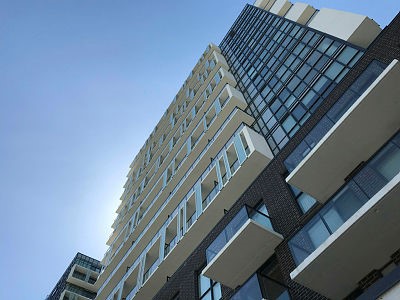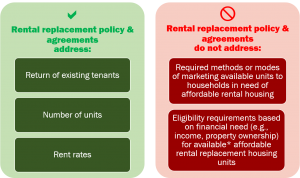
Why this audit matters
In 2007, when the rental replacement policy went into effect, the focus was to preserve and protect the stock of affordable rental housing. In this audit, we highlight that this legacy policy has not caught up to City’s evolving and ongoing priorities for rental housing and should be revisited.
The legacy rental replacement policy objectives and Section 111 agreements implementing the policy requirements are summarized as follows:

Background
A policy objective of the City’s Official Plan is to preserve and protect the stock of affordable rental housing by requiring demolished rental units to be replaced by the same number of units at similar rents. Municipal Code Chapter 667 sets out the City’s requirements under Section 111 of the City of Toronto Act, 2006 and implementation of its Official Plan policy.
By the numbers
City Planning advised that about 2,500 affordable rental replacement units were approved by City Council between 2007 and 2021. Of these social housing and affordable rental replacement units, approximately
• 400 units have yet to be secured through Section 111 and/or Section 37 agreements
• 1,000 units are in developments that have not yet been completed or occupied
• 316 units are in developments that have been fully or partially occupied, where access and eligibility are administered by City Planning
• 777 units are in developments that have been fully or partially occupied, where tenant access and eligibility are administered by SSHA
What we found
Our audit covered over 80% of affordable rental replacement units in 19 developments that were fully or partially occupied, where access and eligibility were administered by City Planning.
Most Section 111 agreements we reviewed required that “The owner shall offer all replacement rental units to the public on a fair and open basis consistent with general provisions in the rental market, subject to the provisions of this Agreement …” However, our audit highlights that revisiting the legacy rental replacement policies provides an opportunity to align them with Council’s affordable housing priorities by:
A. Strengthening Requirements for Offering Affordable Units Through Fair, Open and Transparent Processes
• Agreements were not clear on the City’s expectations for how units would be offered to the general public on a “fair and open basis.” Acceptable methods for marketing and filling affordable units were left open to interpretation.
• Agreements did not clearly specify that the owner was obligated to retain and make available to the City records on how units were offered to the general public. Limited information was retained in City Planning files.
• The City may find it difficult to obtain records and take any further action regarding the way units were offered.
B. Standardizing Affordable Rental Housing Eligibility Requirements including Updating Section 111 Agreements
• Making units available based on financial need was not stated as an objective or requirement of the legacy rental replacement policy and was not reflected in the requirements of most Section 111 agreements.
• Most Section 111 agreements we reviewed did not contain tenant eligibility requirements such as income limits, asset limits, or limitations on owning residential property.
• The City has little ability under the existing Section 111 framework to require that owners offer available affordable rental replacement units only to new tenant households who need affordable housing (i.e. lower-income households).
C. Harmonizing Processes and Requirements for Administering Affordable Rental Housing
SSHA, the Housing Secretariat, and City Planning are harmonizing the management and administration of affordable housing across the City. In July 2021, the Auditor General recommended they consider recommendations raised in previous audits of the social housing waiting list, rent-geared-to-income eligibility, and affordable home ownership program.
How recommendations will benefit the City
Our recommendations focus on what City Planning can do to continue to enhance its agreements and processes to better align with the City’s priorities for making available affordable rental replacement housing accessible to households based on financial need.